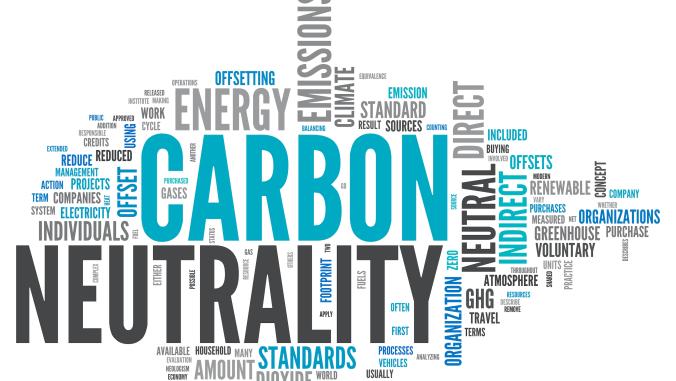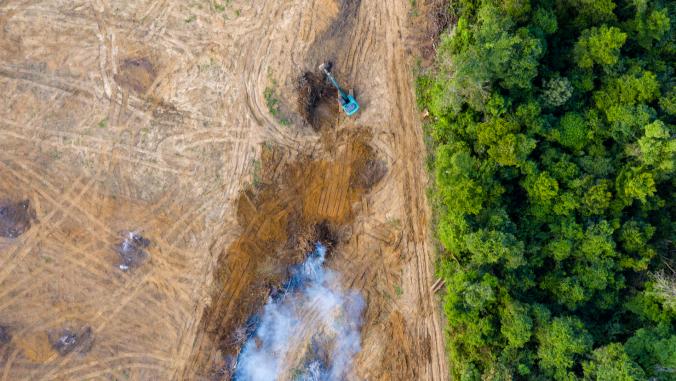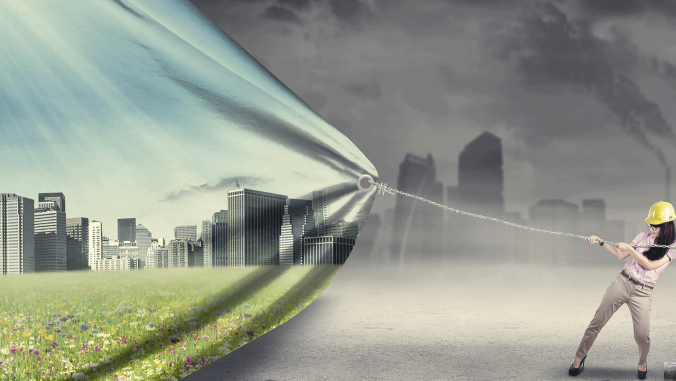The article originally appeared on Ecosystem Marketplace, a Forest Trends Initiative.
It’s an article of faith among optimistic environmentalists that the global response to COVID-19 will hasten the demise of the science denial movement and accelerate efforts to meet the climate challenge.
An overwhelming majority of veteran environmentalists surveyed by Ecosystem Marketplace, however, fear that the convulsive response to COVID-19, expected to reduce greenhouse-gas emissions by just over 5 percent this year, will detract from the emerging structured response needed to meet the Paris Climate Agreement’s 1.5 degrees Celsius (2.7 degrees Fahrenheit) target, which requires emissions to fall 7.6 percent annually for the next decade.
The key factor, they say, will be how NGOs, governments and especially media respond to the crisis.
Climate and COVID-19: a blend of approaches
The emerging response to the climate crisis, like the response to COVID-19, blends mandatory restrictions with voluntary efforts that go beyond the requirements of law. The survey focused primarily on the voluntary component, where dozens of leading companies, from Microsoft to Amazon to Interface Carpets, have pledged to achieve "net zero" greenhouse gas emissions at different dates in the future, in part by switching to sustainable energy but also by using carbon finance to offset those emissions they can’t eliminate.
Earlier this year, for example, U.S.-based Delta Air Lines announced that it would begin offsetting all greenhouse-gas emissions generated by its flights worldwide, effective March 1 — initially by purchasing verified carbon offsets generated by saving forests, restoring wetlands and improving soil quality. It was just one of dozens of "net-zero" commitments that companies have made in the past year.
Most developers are confident they can keep existing projects going for at least the next year, but a delayed recovery could mean industrial emissions begin rising just as forest projects begin to falter.
All emission reduction strategies, whether compliance-driven or voluntary, hinge on the emitter’s ability to first reduce fossil-fuel emissions — by, say, switching to renewable energy or improving practices — and only then offsetting the remaining emissions by purchasing carbon offsets.
Most companies that voluntarily have committed to net-zero emissions aim to at least partly do so by supporting "natural climate solutions" that protect or revive living ecosystems, such as forests and wetlands, or promote sustainable agriculture, according to Ecosystem Marketplace’s "2019 State of Voluntary Carbon Markets." But are these companies sticking with their commitments?
Interviews with corporate buyers indicate that they are, but interviews with project developers indicate that at least some companies are not.
On Earth Day, for example, Delta CEO Gareth Joyce reiterated the company’s net-zero pledge via a post on LinkedIn, declaring that "sustainability is a long-term commitment." Microsoft, Interface, Amazon and other companies contacted by Ecosystem Marketplace all reaffirmed their commitments. At the same time, issuance figures published by the standard-setting body Verra show strong numbers through March, by which time most of the world already was on lockdown.
The people who develop forest carbon projects, however, are bracing for lean years ahead, according to an informal survey of 13 leading project developers conducted by Ecosystem Marketplace.
All respondents are regular contributors to Ecosystem Marketplace’s annual State of Voluntary Carbon Market report, and all surveys were conducted on condition of anonymity. Six respondents, however, agreed to follow-up interviews and many others provided subjective feedback in their responses.
Developers fear COVID-19 will distract from climate challenge
While project developers welcomed the drop in emissions, most feared emissions would rebound after the pandemic, and that the net effect could be a loss of momentum towards meeting the climate challenge, rather than the impetus for meeting it that many pundits have proclaimed. Some also feared that many companies would lose the climate plot in the short term and then expect too much from offsetting when they finally turned their attention to the challenge again.
"Engaging with us is an intermediate step in a multi-step stocktaking to understand what emissions companies can eliminate internally and what they have to offset," said one respondent. "Many companies were only now beginning to internalize the size and scope of the reductions that are needed, and another year or two could be detrimental if they put that process on hold."
A staggering 71.43 percent of developers said COVID-19 was likely to distract from efforts to implement long-term solutions to climate change, while only 14.29 percent said it would raise awareness.
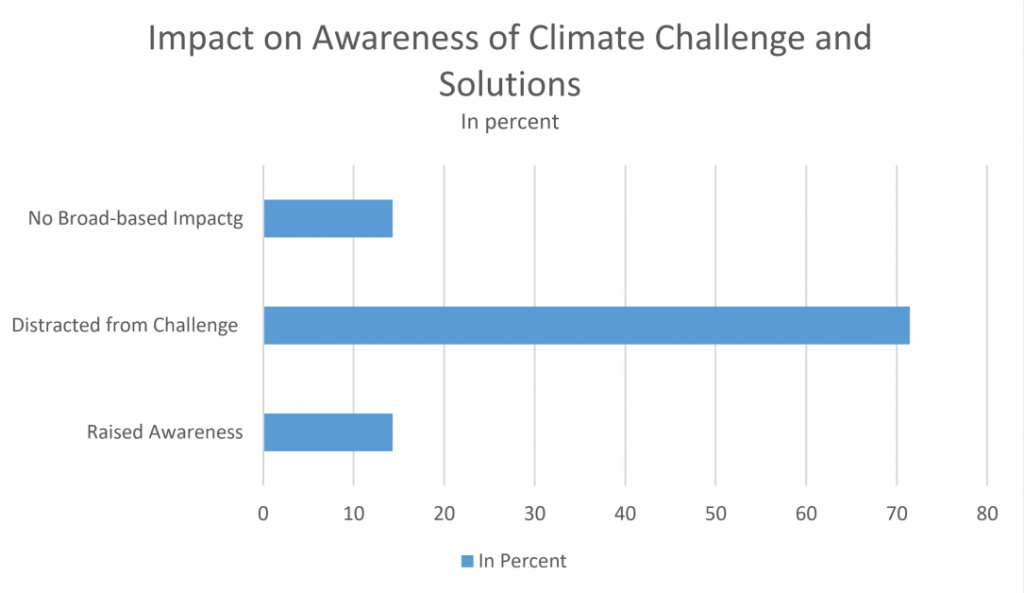
We’ve seen it all before
This sentiment echoes an observation that Dutch climate consultant Jos Cozijnsen (not a survey respondent) made in Ecosystem Marketplace in April.
"The 2008 financial crisis also raised hopes for a green re-set, but that re-set failed to materialize," he wrote. "Yes, global CO2 emissions from fossil fuel combustion and cement production fell 1.4 percent during the crisis, but they rose 5.9 percent when it finished."
He also pointed out that the 2008 financial crisis was only one of several economic catastrophes that seemed to promise lower emissions.
"This is a pattern we’ve seen after several previous crises, each of which came with declarations of a new, green future," he wrote. "It’s an admirable ambition, but history shows that this doesn’t happen automatically."
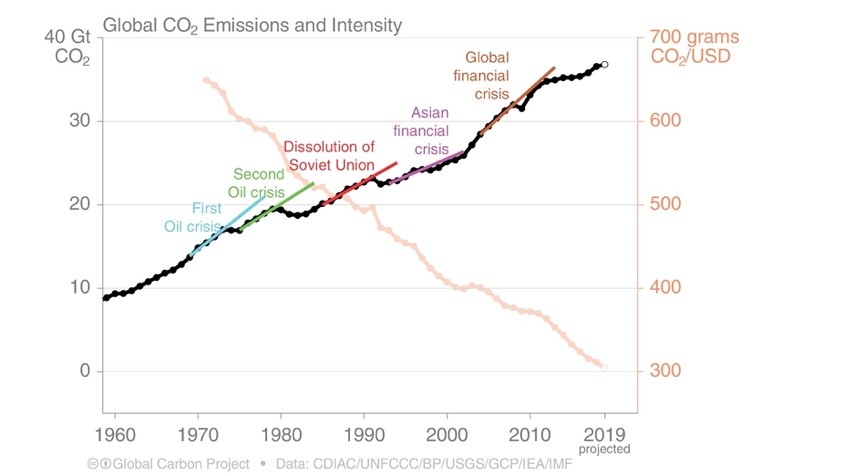
Media, NGOs and government can play role
Although respondents said COVID-19 would not automatically increase awareness of climate solutions, those who offered commentary said it could be proactively leveraged to promote awareness — but only if media, NGOs and governments can muster the messaging to counter anti-science outfits such as the Heartland Institute and Heritage Foundation.
"Sadly, the climate-change denial movement has been much more proactive in messaging than has the environmental movement," wrote one respondent. "Media has also failed to step up, especially in covering complex solutions involving supply chains and deforestation, which leaves the general public kind of lost."
"The media has an important role on leveraging awareness around the climate challenge in a moment that climate-related issues are set aside," echoed another. "Beyond that, aligned governments can act to avoid a rebound in emissions when the pandemic ends, if climate-related issues are taken in consideration along with economic ones."
Current market uncertainty
Respondents said some current emission reductions might remain low — especially if distributed workplaces and conferences become permanent. Most, however, feared a rebound in industrial emissions — especially if governments move to support the fossil fuel sector at the expense of renewables.
At the same time, no respondents reported cancelled orders, although most were revising their 2020 expectations downward.
Specifically, five of the 13 project developers surveyed reported that buyers had asked to delay the delivery of existing contracts, while three reported a drop in new or expected sales and two reported both requests to delay existing sales and a loss of anticipated deals. Put another way, five reported no impact on sales yet, while eight reported some degree of impact.
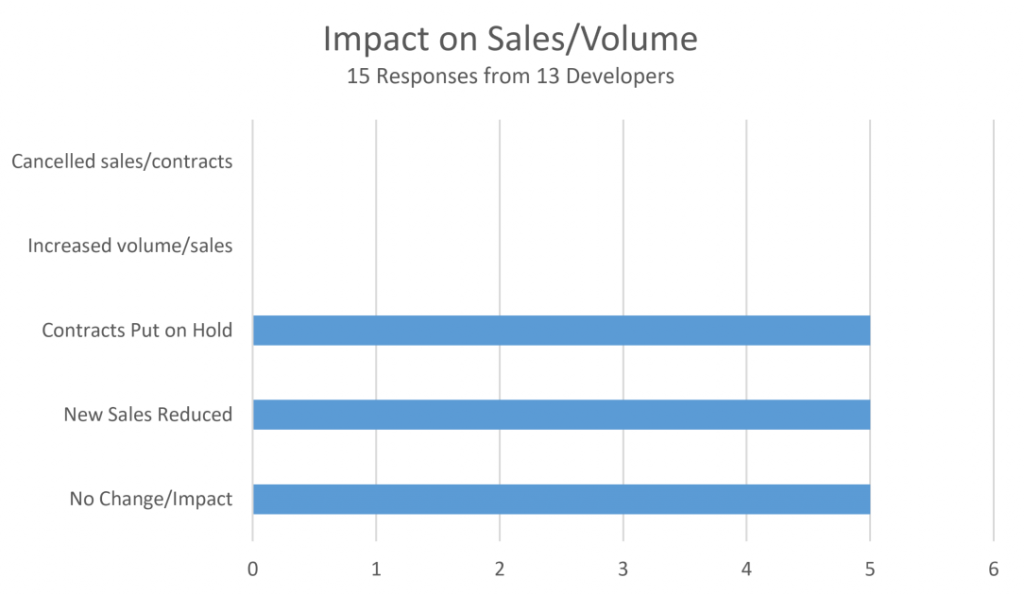
Cash crunch, not reduced emissions, forces most postponements
Airlines had emerged as some of the most prolific buyers of carbon offsets in late 2019 and early 2020, and all airlines contacted by Ecosystem Marketplace reiterated their net zero commitments. Given the dramatic reduction in air traffic, it makes sense that airlines would postpone their purchases and still meet their commitments, as they would be offsetting less emissions.
Seven of the eight respondents reporting impacts chose to speculate on the reasons, and most pinned the blame on buyer hardship.
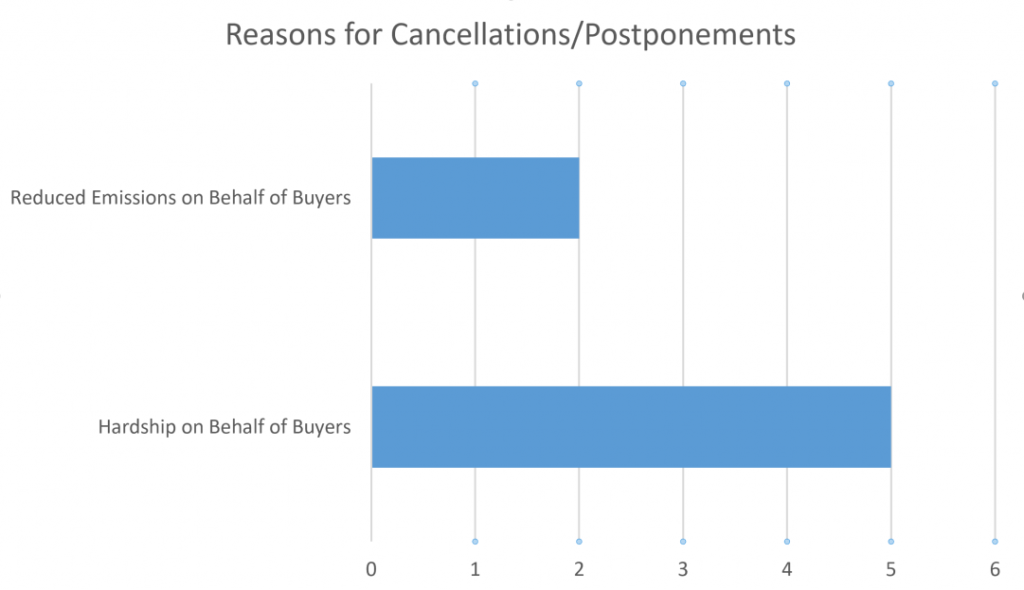
Juggling the year ahead
Only two companies surveyed said that the COVID-19 pandemic had no impact on their operations, and only three said they had been forced to lay people off so far.
Respondents were able to submit multiple responses. Six reported they had furloughed staff with the intent of keeping them in the fold and five reported they had implemented a hiring freeze.
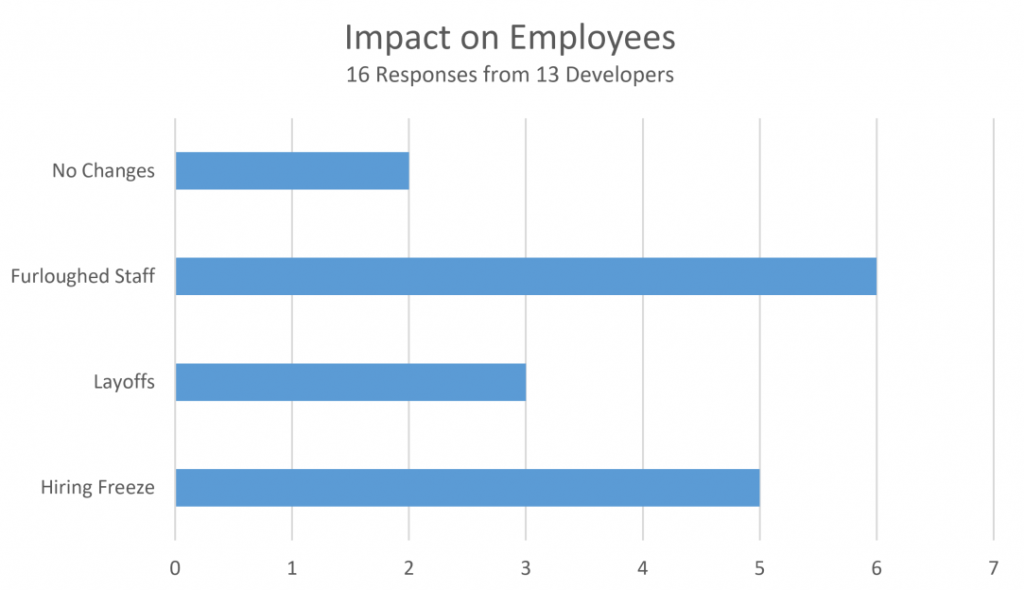
Logistical challenges
The largest disruption appears to be logistical, with 11 respondents reporting the imposition of travel restrictions, but only four of these restrictions endanger the environmental quality of the projects.
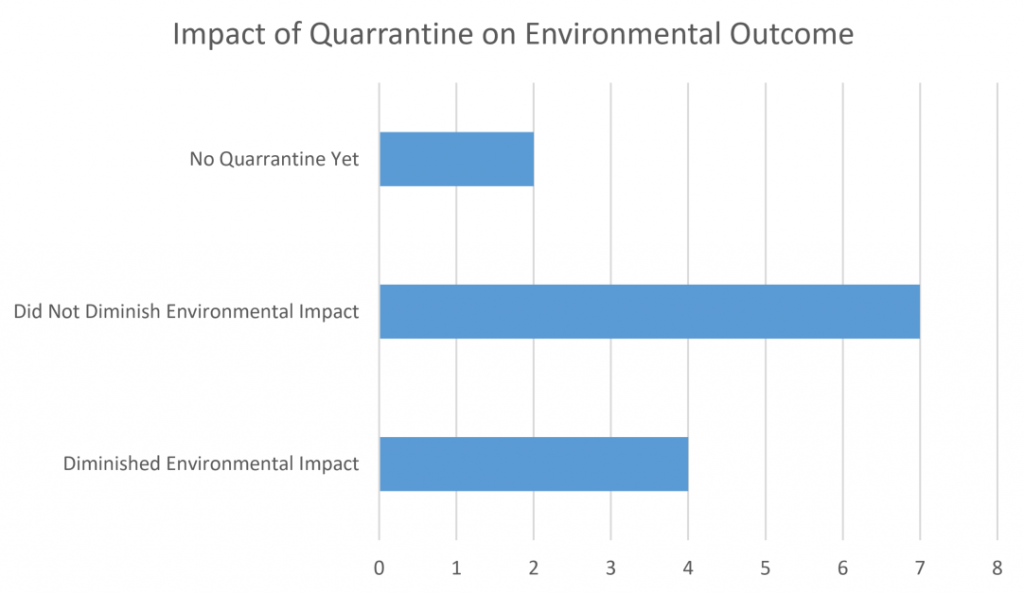
Most developers are confident they can keep existing projects going for at least the next year, but a delayed recovery could mean industrial emissions begin rising just as forest projects begin to falter.
If that happens, the costs of COVID-19 will be astronomical.


